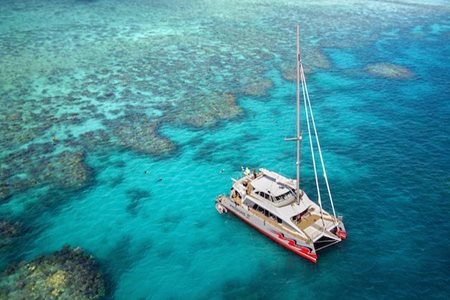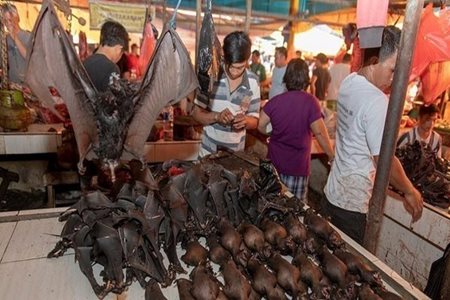.png.aspx;?width=450&height=450) One of the positive byproducts of the COVID-19 outbreak is that the earth is healing. Some of this is due to the fact that there are not as many automobiles on the roads, boats in the water, or factories producing emissions, while some improvements are due to governmental regulations or small businesses pitching in to help with newfound “downtime.”
One of the positive byproducts of the COVID-19 outbreak is that the earth is healing. Some of this is due to the fact that there are not as many automobiles on the roads, boats in the water, or factories producing emissions, while some improvements are due to governmental regulations or small businesses pitching in to help with newfound “downtime.”
Scuba Tour Operators Volunteer to Restore Great Barrier Reef

Passions III at Reef Source: karryon.com.au
With the Australian tourism industry in a holding pattern, one scuba dive tour operator, Passions of Paradise has volunteered to plant coral on the Great Barrier Reef. The company donated their state-of-the-art catamaran and fuel to transport four enthusiastic crew members and a scientist to the Hastings Reef for the Coral Nurture Program. Passions of Paradise was one of five Cairns and Port Douglas reef companies participating in the project with Wavelength, Ocean Freedom, Sailaway and Quicksilver Cruises also involved.
Milan, Italy Plans to Reduce Car Use Post-Lockdown
In recent times, the Italian city of Milan has been one of Europe’s most polluted cities, however with a nationwide lockdown imposed and less automobile traffic, air pollution has dropped. In hopes of keeping this momentum going, the city is poised to adopt one of Europe’s most ambitious plans to reduce car use post-lockdown. The city has declared 35 kilometers of streets will be transformed into walking and cycling space over the summer. The plan will include low-cost, temporary cycle lanes, new and widened pavements, 30kph/20mph speed limits, and pedestrian and cyclist priority streets in low traffic neighborhoods.
Wildlife Trade Bans

Many medical experts place the blame on the COVID-19 pandemic as well as other viral pandemics on the exotic animal trade industry and black markets that includes the sale of bats, dogs, cats and other animals. This previously underregulated and unsanitary industry has historically been detrimental to endangered animal populations such as rhinoceros, elephants, crocodiles, tigers, turtles and pangolins that have been killed for food and homeopathic “medicinal cures.”
Under global pressure, countries such as China and Vietnam have decided to ban the consumption of wild animals. China imposed a ban on all farming and consumption of “terrestrial wildlife of important ecological, scientific and social value,” which is expected to be signed into law later this year. After conservationists sent an open letter to Vietnam’s prime minister recommending action against the wildlife trade, the country is also going to halt the import of imperiled animals to eat.